The Economist Western Balkans Summit sends a strong message: We expect The EU to materialize its promises
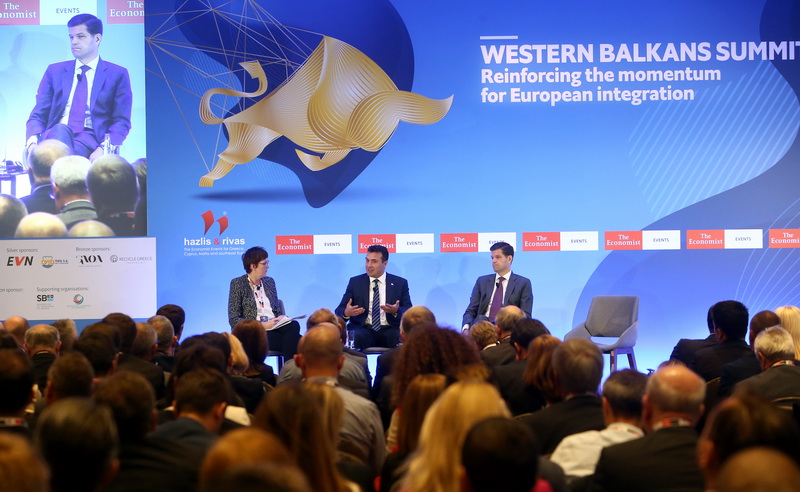
Date for starting accession negotiations with North Macedonia or the EU will undermine its own credibility – was the common message of all participants at the Economist Western Balkans Summit held in Skopje yesterday. There was a general belief that there was little room for a negative response this time, but German politician and longtime EU insider Martin Schulz warned that “when it comes to the EU, nothing can be foreseen”.
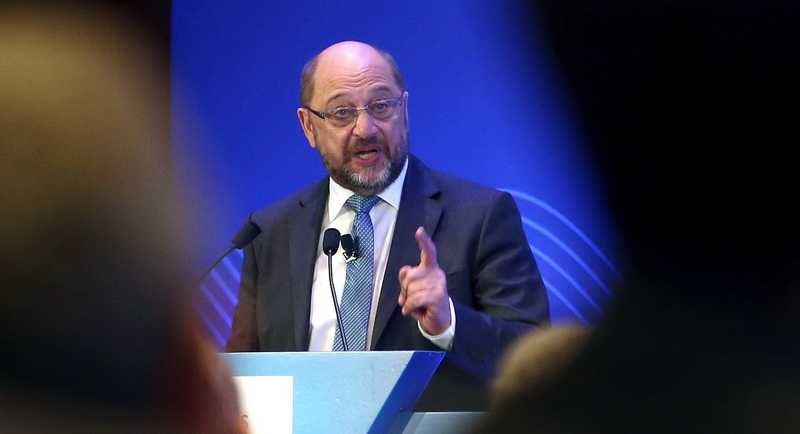
Guy Verhofstadt, Wess Mitchell, Dimitrios Papadimoulis as Vice President of the European Parliament gave strong support for starting accession negotiations with North Macedonia, but the support from former Greek Prime Minister Alexis Tsipras for a accession negotiations date at the upcoming European Council meeting seemed to be the strongest.
“The Prespa Agreement demonstrates the values that the EU is fighting for. Membership to the EU is also a part of it. The agreement reaffirms EU’s ambition to establish peace and stability in the region”.
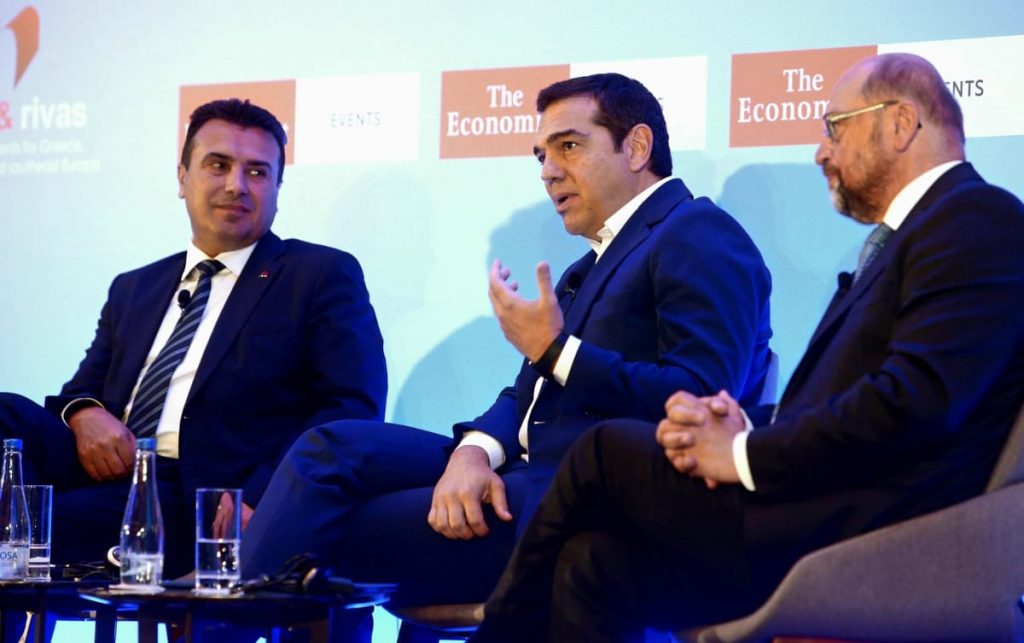
There have been great and bloody conflicts in the Balkans throughout history, some of them due to the wider territory of Macedonia. With the Prespa Agreement, North Macedonia and Greece decided not to remain trapped in the past. The Prespa Agreement symbolizes the win of democracy and cooperation over nationalism and introversion”, Tsipras pointed out.
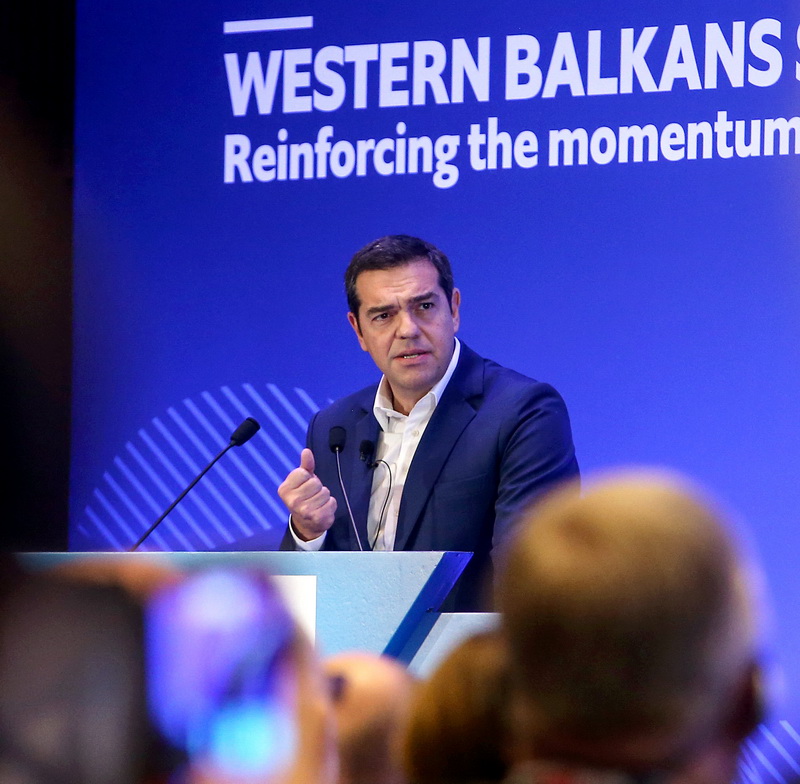
He added that the agreement was concluded because “we were lucky enough” to have progressive governments unburdened by nationalism in Athens and Skopje. “North Macedonia is a country that promotes the enlargement process within the frames of the European legislation. It demonstrates that the country is a credible partner to the EU and the EU should approve a date for start of accession talks at the upcoming meeting of the EU Council”.
Former Belgian Prime Minister and current MEP Guy Verhovstadt, at the beginning of his address, illustrates in a specific way how the name dispute was perceived in European circles. “For years, for decades, European leaders (including the late Jacques Chirac) have been asking me how I can explain this name dispute because I come from Belgium, a linguistically and geographically divided country. I didn’t have a good answer, but I know that the Western Balkans is historically, culturally and economically in Europe. Its EU membership is important both politically, economically and in terms of security. It is best for everyone to sit at the same table. All Balkan countries should join the EU as soon as possible. Integrate the Balkans in the Union and all problems are solved”, said MEP Guy Verhofstadt.
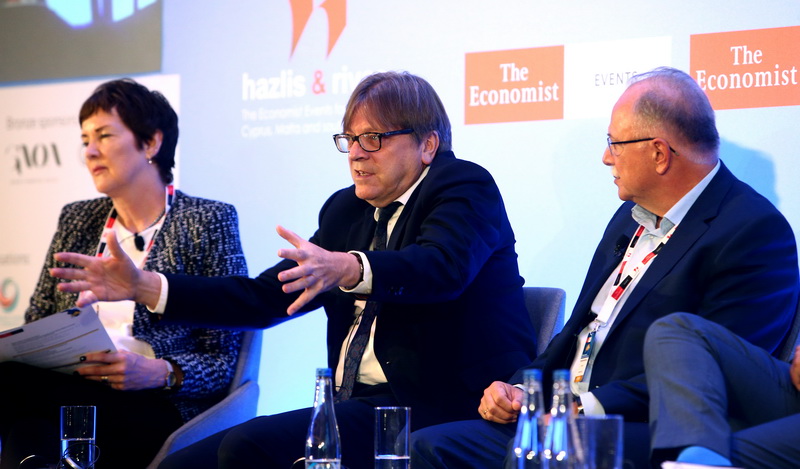
He said the need for enlargement with the Balkans is of economic, political and geopolitical reasons, namely the region’s stabilization and preventing the return of violence in the area.
“There are obstacles in the EU which I believe will be resolved. I hope the European Council takes a positive decision in October and starts negotiations,” he added.
Verhofstadt noted there is still resistance regarding enlargement among certain EU member-states due to the fear from migration processes, adding that youth migration should not be seen as a negative phenomenon on the long run, because the accession of new members would solve the future of young people.
Former European Parliament president Martin Schulz also said the European Union should deliver a date for the start of North Macedonia and Albania’s accession negotiations in October.
“This should definitely be the case, I believe that we should keep our promises, especially in politics. I hope the Council will decide to start the accession negotiations in mid-October, as promised. I hope there will be no further delays. However, my experience of working for three decades in the European institutions and in European politics tells me that nothing can be foreseen. Therefore, I do not know what will happen,” Schulz told a discussion during The Economist Western Balkans Summit in Skopje.
According to him, EU leaders have started to play games on European issues in their own countries since 2005, referring to the example of former British PM David Cameron and the referendum decision that he promised to the conservatives just to survive.
“This is why I am relatively certain of a ‘Yes’ vote on October 15. However, if you want a guarantee, I do not think any member of the EU Council can do that. Considering that the Germans and French are a Yes, I hope this will be affect a positive settlement of the issue,” noted Schulz.
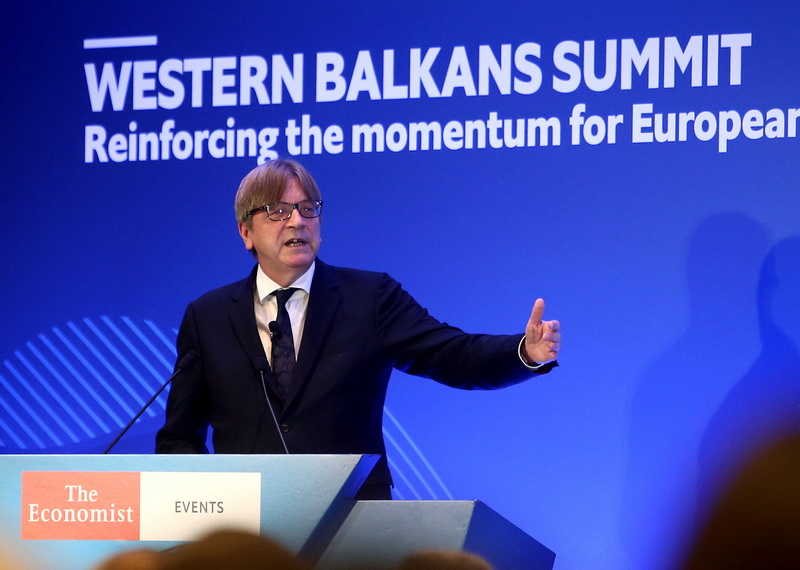
The West must show that positive examples are rewarded and the Prespa Agreement was such an example. It opened a new chapter in relations between Greece and North Macedonia, gave opportunities for better economic cooperation and opened Skopje’s path towards the European Union. The deal also has an effect on the entire region and its integration, former US Assistant Secretary of State for European and Eurasian Affairs Wess Mitchell told The Economist Western Balkans Summit in Skopje.
Mitchell also referred to the Bulgaria friendship treaty, the expected start of North Macedonia and Albania’s EU accession negotiations and the Belgrade-Pristina dialogue.
“These are positive events that were unimaginable a while ago. These are processes that go much deeper. We in the West did not think that the Balkans could overcome the challenges in a political, economic and security sense, but it seems these times are over. The region and the world looked much different compared to the 1990s. Sixteen years have passed since the Western Balkans was promised a European perspective in Thessaloniki. We finally expect this to materialize,” said Mitchell.
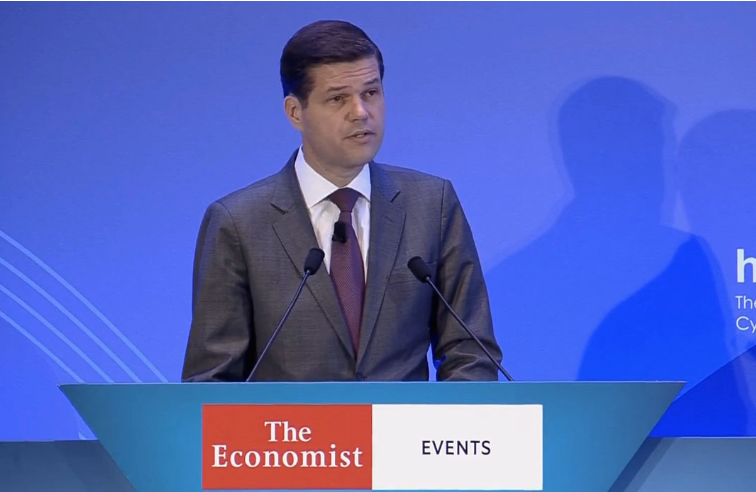
He issued a caution that if regional countries failed to join the EU, something else would fill that void, be it Russia, China or fresh ethnic conflicts.
“We must support the region both economically and politically. The West should see countries in the area as means for peace and prosperity, while these countries should realize that by preventing the path of their neighbors, they prevent their own path,” said Mitchell.
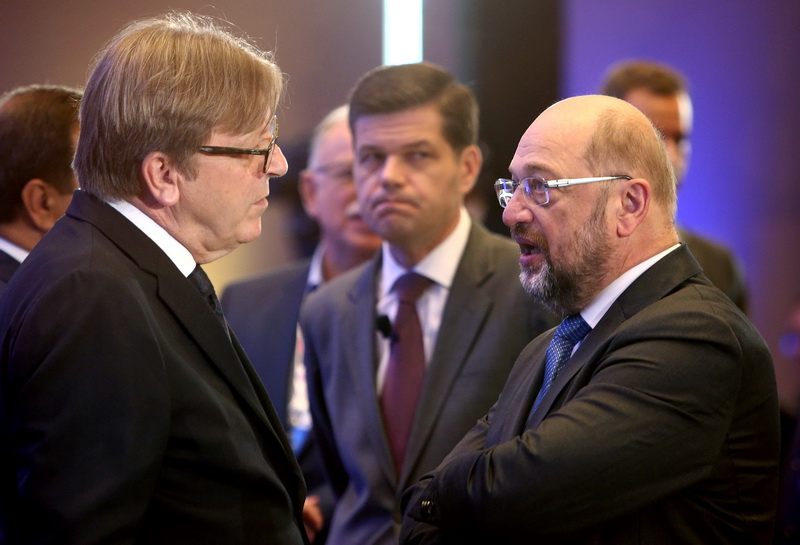
North Macedonia’s Prime Minister Zoran Zaev, who opened the conference, warned that unless the European Council does not decide in favor of North Macedonia and the starting of accession negotiations, it will punish the best example for the countries in the region. He mentioned that the country has been in the EU’s waiting room for the past 15 years and that it does not understand how some members oppose enlargement when we only ask for starting accession negotiations and get a chance to transform our society.
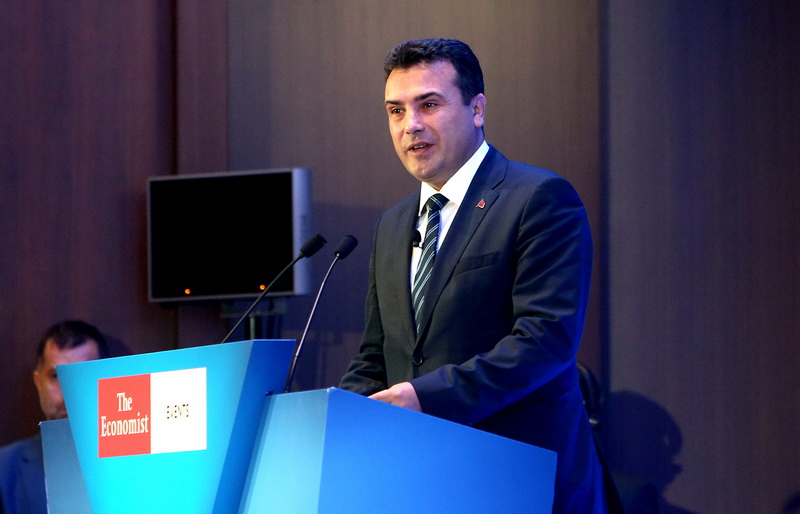
“Our neighbors that are already part of the EU – Greece, Bulgaria, Romania, Croatia, as well as Austria, Hungary, Italy have used the opportunity at the UN General Assembly to once again show that they support the whole Western Balkans, especially North Macedonia and the country’s aspiration to become part of the Union”, Zaev said referring to the fight against corruption, Zaev said that there were cases that were ongoing and that for the first time the country showed independence in the judiciary and thus, he emphasized, a message has been sent that it was no longer profitable to be a criminal.
Asked by the event moderator what would happen to the country if the EU decided not to set a date again, Deputy Prime Minister Bujar Osmani was very pessimistic:
“The European Union will undermine its own credibility if it fails to validate North Macedonia’s progress. It would endanger the region’s European perspective and the enlargement process as we know it.” Deputy PM Osmani voiced assurance over a positive outcome for the country, saying the start of accession negotiations would be an excellent opportunity for everyone to create a more stable, safer, more prosperous Europe.
“A united EU and a stronger consensus will not be considered a problem but an opportunity for all,” added Osmani.
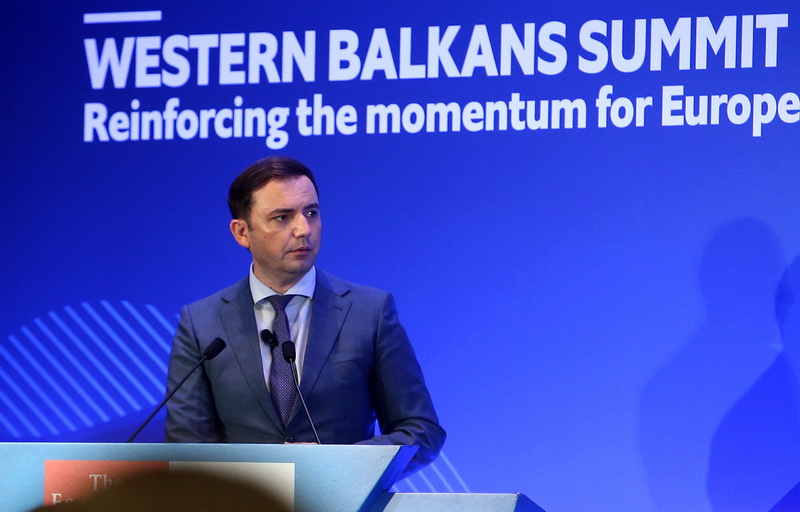
He also referred to current developments related to the EU enlargement in the country and the region, ahead of the Council Summit in October. “The summit is the key foundation for the future of EU’s integration process and the progress achieved thus far is directly linked to the decision Council,” said the deputy prime minister.
European Parliament Vice-President Dimitrios Papadimoulis called on the EU Council on Monday to start accession negotiations with North Macedonia and Albania, underlining that the positive momentum in the region is not to be missed.
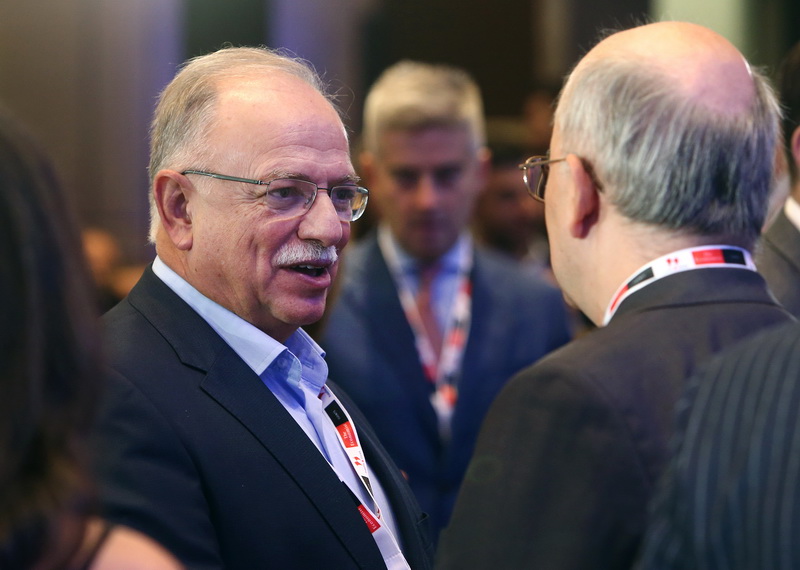
“The government of North Macedonia has proven its commitment to the EU and demonstrated its courage to make progress in important reform areas. You’ve been saying for years that each country should move forward based on its own merits. So, prove your strategy and don’t relate the process of EU integration of one country with that of another,” Papadimoulis said in his address to the EU Council.
Tsipras reminded that when Foreign Ministers of the two countries at the time, Nikola Dimitrov and Nikos Kotzias, had signed the agreement, there’d been a hands-on feeling of building history.
(NR)
Photos: Boris Grdanoski